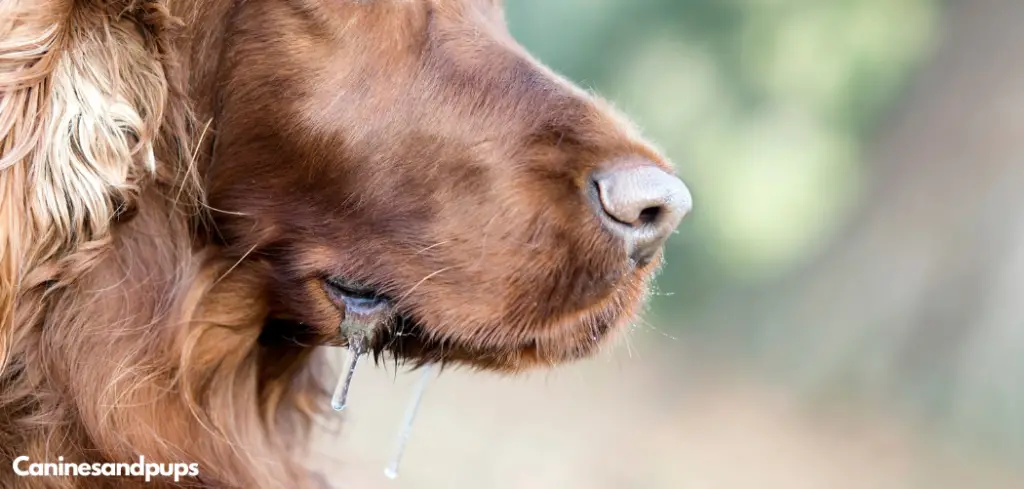If your dog is drooling and not eating but drinking water, you’re right to be concerned.
While staying hydrated might seem like a good sign, the refusal to eat paired with excessive drooling can point to an underlying illness.
Dogs typically associate mealtime with excitement, so when they avoid food but continue to lap up water, it’s often a red flag that something is wrong.
We outline why this might be happening, what you can do at home, and when it’s time to call your vet.
Dog Drooling and Not Eating but Drinking Water: Why It Happens
When a dog is drooling and not eating but drinking, this combination of symptoms is often tied to dental pain, nausea, stomach issues, anxiety, or oral trauma. Dogs that are drooling and not eating but drinking water may be trying to soothe a sore mouth or upset stomach, or they may feel unwell but not dehydrated.
While some causes are mild and temporary, others may need urgent veterinary intervention to prevent complications.

Dog Drooling and Not Eating but Drinking Water: Common Causes
Dental Pain or Oral Infections
When your dog is drooling and not eating but drinking water, it could mean their mouth is too painful for chewing.
Dental infections, broken teeth, or gum disease can all cause intense discomfort.
However, drinking water might still feel tolerable or even soothing, especially if it helps cool inflamed gums.
You might also notice your dog licking their lips, pawing at their face, or only eating on one side of the mouth.
A dental exam is essential in these cases, as untreated oral issues can lead to abscesses or systemic infection.
Related: Dog drooling and not eating (Causes and when to worry)
Nausea or Upset Stomach
Nausea is another common reason a dog may drool and avoid food while still drinking water.
Gastrointestinal irritation—whether from spoiled food, dietary indiscretion, or a sudden change in diet—can make your dog feel queasy.
Drooling is often a prelude to vomiting or a sign that your dog is struggling with stomach acid or gas.
Water might be consumed to ease nausea or simply because thirst remains intact.
If vomiting follows or your dog shows signs of abdominal discomfort, consult your vet to rule out serious digestive issues.
Anxiety or Stress
Dogs experiencing anxiety may drool more than usual and lose interest in eating. Stressors such as a recent move, thunderstorms, a new pet, or separation from their owner can lead to changes in behavior.
If your dog is drooling and not eating but drinking water during stressful events, emotional distress might be the cause.
Keep an eye out for pacing, whining, or hiding behavior. Supporting your dog with a calm environment, familiar routines, and positive reassurance can help reduce stress-based symptoms.
Mouth Injury or Foreign Object
Dogs sometimes injure themselves by chewing on hard or sharp items.
Splinters from bones or toys may lodge in the gums or tongue, causing pain and excessive salivation.
If your dog refuses food but still drinks water, it could be because drinking doesn’t aggravate the injury as much as chewing does.
Check inside your dog’s mouth carefully—but gently—for signs of swelling, cuts, or foreign bodies. If something is stuck or appears infected, seek veterinary care right away.
Ingested Something Toxic
In some cases, drooling and food avoidance are signs your dog has ingested something toxic—like chocolate, household chemicals, or a poisonous plant.
Dogs may continue to drink water in these situations, possibly due to dry mouth or an attempt to flush the toxin.
Toxins can act quickly, so if these symptoms appear suddenly or are accompanied by vomiting, lethargy, or tremors, call your vet or an emergency clinic immediately.
What to Do if Dog Drooling and Not Eating but Drinking Water
If you notice your dog is drooling and not eating but drinking water, take these practical steps:
Inspect their mouth for signs of injuries, swelling, or foreign objects.
Offer bland food like boiled chicken and rice to test appetite.
Keep your dog calm and monitor for other signs like vomiting, diarrhea, or restlessness.
Don’t force food but make sure fresh water is always available.
Withhold treats or table scraps, which could further irritate the stomach.
If your dog skips more than one meal or starts showing other concerning symptoms, it’s time to seek professional advice.
When to Call or Visit Your Vet
It’s important to contact your vet if:
Your dog drooling and not eating continues for more than 24 hours.
Other symptoms appear—like vomiting, diarrhea, weakness, or visible mouth injuries.
You suspect your dog ate something toxic or dangerous.
Your dog has a known health issue that could be worsening.
Even if your dog is drinking water, prolonged appetite loss combined with drooling can signal something serious that needs diagnosis and treatment.
Related: Old dog drooling and not eating (What it means)
Key Takeaway
A dog drooling and not eating but drinking water is trying to tell you something isn’t right.
While some causes are minor and pass with rest, others—like dental problems, toxins, or internal illness—require prompt attention.
Monitoring your dog’s behavior, trying gentle home care, and consulting your vet when needed can make a big difference in their comfort and recovery.
Trust your instincts. You know your dog best—and when they’re not acting like themselves, a little caution goes a long way.
